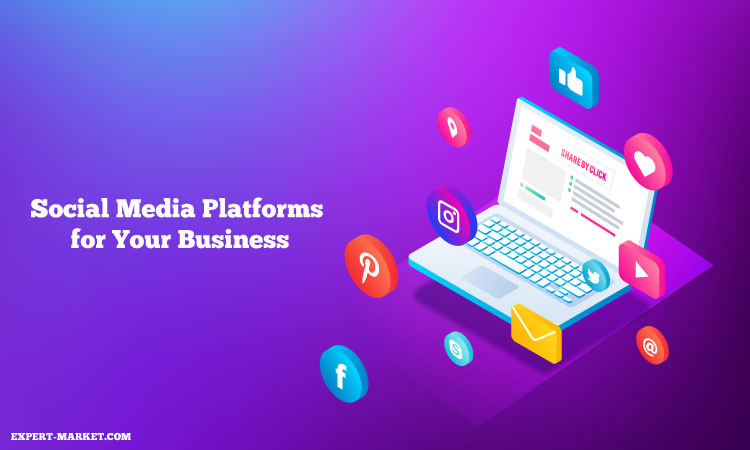Every business should be on at least one social media platform in 2019. Social media helps businesses boost credibility and SEO and reach prospective buyers. However, if you choose the wrong one, your marketing plans might flounder. So, which social media platform is right for your business, and why?
Every business should be on at least one social media platform in 2019. Social media helps businesses boost credibility and SEO and reach prospective buyers. However, if you choose the wrong one, your marketing plans might flounder. So, which social media platform is right for your business, and why?
Before Choosing a Social Media Platform, Evaluate Your Business
First, you should ask yourself some questions. Does your business have timefor social media? If not, can you scrape up a budget for a social media manager, or give that intern some extra responsibilities?
Once you get past the problem of time, it’s crucial to consider who you’re selling to.
Who is your target audience?
Think age range and gender to start, and narrow from there. Makeup Company XYZ, for example, may primarily serve women ages 13-25.
Ask yourself these questions to further narrow down audience demographics:
- Where is my target audience geographically located?
- Does my audience have kids?
- What challenges do my audience face, and can my business solve them?
- What’s their average annual income?
Once Makeup Company XYZ further dug into brand discovery, it was revealed that their biggest audience is actually busy California moms who have plenty of extra income to spare but want high-quality quick-application products.
Not only does knowing your target audience change how you communicate, it may also affect the channel you choose to do so.
Each platform has its own built-in community who may, or may not, be compatible with your target audience. Prioritizing the wrong platform can mean the difference between lukewarm sales and real success.
Are you selling to a customer (B2C) or selling to a business (B2B)?
You should also understand who you’re selling to – an individual customer, or a business. Your tone and content depend on who buys your products. The best social platform will, too.
Take this fictional example: Hudson River Metal Manufacturers sells primarily to roofing contractors. They’re looking to reach more business leaders in the construction industry, so they start a Pinterest campaign.
They’re later shocked to learn that the reason Pinterest didn’t work for them is because Pinterest is more geared toward individual consumer audiences than to businesses. Since Pinterest’s largest demographic is women and 90% of the construction industry consists of men, their content likely wasn’t reaching many business leaders, anyway.

What’s your long-term goal?
What does social media mean to your business?
- Is it a tool to reach potential new customers or increase sales?
- Do you hope to showcase your company’s workplace culture so you can attract talented employees?
- Is social media simply a tool to remind people that your business exists (and is living in the 21stcentury)?
Answering these questions helps businesses focus on one or two important items and reinforce brand messaging.
Now that you’ve asked yourself these questions, what arethe best social media platforms for business this year? I’ll break down the following social media channels, including their main audiences:
- YouTube
As of June 2018, Instagram has 1 Billion monthly active users and is the second most engaging social platform, coming in after Facebook. 50% of users follow brands, as well, which is good news for business.
Quick Demographic Facts:
- 71% of Instagram users are under age 35, making it one of the most popular platforms for young people and the businesses who target them.
- Users ages 25-35 account for most of Instagram’s users, making the platform a popular choice for B2C advertisements.
- A roughly equal number of men and women actively use Instagram.
If you have hashtag skills along with a rich portfolio of images and/or video clips, Instagram is one of the best options for businesses looking to boost engagement, especially with young audiences.
The most successful industries on Instagram: Health and fitness, travel and hospitality, fashion, food and beverage, e-commerce, and beauty, among others.
Best business use: B2C
Facebook recently dropped to the third-most visited website globally, trailing behind YouTube. A fact like that might make you worry that rumors of people flocking away from the website are true.
However, a whopping 68% of Americans use Facebook. Globally, 22.9% of the world uses Facebook and that number is growing. It’s popular among all demographics, boasts laser-focused ad targeting, and even offers a free, reliable post scheduling system.
Quick Demographic Facts:
- Facebook users are more likely to have a bachelor’s degree than just a high school diploma.
- Only half of teens use Facebook in 2019, a significant drop from just three years ago when 71% of teens used it.
- The percentage of American Facebook users ages 65+ has increased to 46%, demonstrating massive growth among older users.
- Lower income households are likelier to use Facebook than other platforms.
- Three-quarters of women in the United States use Facebook, compared with 63% of men.
Perhaps one of the best things about Facebook is its status as a discovery platform. 78% of American consumers have discovered retail products on Facebook, outranking Instagram and Pinterest, who only reached 59% of users.
The most successful industries on Facebook: Health and fitness, travel and hospitality, food and beverage, e-commerce, entertainment, and beauty, among others.
Best business use: B2C
LinkedIn is no longer the seldom-used platform it once was, and users don’t just use it to find employment anymore.
Quick Demographic Facts:
- Almost a quarter of LinkedIn’s users are ages 18-29.
- 61% of LinkedIn users are 30-64 years old. This group is likeliest to buy consumer goods and make business purchases.
- 21% of LinkedIn users are over age 65. They have more discerning consumer tastes, but may be more receptive to brand marketing since this group generally has the most free time.
- Three-quarters of LinkedIn users earn over $50,000 per year.
LinkedIn is a must-have social media resource for any company that hires employees, conducts B2B transactions, or wants to reach potential B2C customers through lead generation.
The most successful industries on LinkedIn: Marketing, tech, e-commerce, finance, IT, and human resources, among others.
Best business use: B2B, in some cases B2C
More than 250 million users are active on Pinterest each month, so it can be a great option for businesses who have useful, engaging content to share.
Quick Demographic Facts:
- Pinterest reaches 83% of women in the United States ages 25-54. In fact, most Pinterest users are women. Since women make 80% of household purchasing decisions in America, it’s the place to be for businesses who sell to women.
- However, half of all sign-ups in 2018 were men who use the site to browse DIY work, home décor, and the outdoors, indicating that the platform’s demographics are shifting slightly.
- Pinterest is most popular among those earning $75,000 or more annually, but still attracts a high percentage of users who earn $30,000 – $74,999 annually.
- An almost equal percentage of Pinterest users are from urban, suburban, and rural communities.
It’s a no-brainer to use Pinterest if your business targets women, especially if your brand is in the lifestyle industry.
The most successful industries on Pinterest: Health and fitness, travel, fashion, arts and crafts, food and beverage, home and garden, and beauty, among others.
Best business use: B2C
An outstanding 500 million tweets are sent each day. With CEO Jack Dorsey committed to turning Twitter into a healthier, more valuable platform, eyes have turned to Twitter for possible branding opportunities. Sunny Delight, for example, has achieved incredible engagement by rebranding as a humorous and relatable company.
However, not everyone is as enthusiastic about using Twitter for business. Every tweet has a half-life, meaning that a tweet gets half of all its interactions in the first half hour of publishing, and halves every hour after that. Because of this, Twitter requires a more hands-on approach than other platforms, and often, that means tweeting more than once per day.
With changes to the platform on the horizon, some businesses express uncertainty about using the platform to build an audience. However, 75% of B2B businesses market on Twitter as of January 2018. Businesses with a solid understanding of the platform can also take advantage of it for customer service purposes, as well as to listen for what people are saying about their brand.
Quick Demographic Facts:
- 80% of Twitter users are not American, making the platform a questionable choice for U.S. businesses who only serve domestic customers.
- Just 24% of U.S. adults use Twitter. They’re typically urban, well-educated, and high income. With just 1% of growth expected over the next year, this is unlikely to change.
- 45% of Americans ages 18-25 say they use Twitter.
The most successful industries on Twitter: Health and fitness, politics, entertainment, tech, e-commerce, food and beverage, and beauty, among others.
Best business use: B2C, some B2B
YouTube
Nearly 2 billion users log into YouTube every month, many of whom see ads on their content. However, businesses might be interested in more than just advertising. Opportunities abound to create your own videos, sponsor others’ videos, or partner with brand ambassadors willing to talk about products on camera.
If your business has the resources to do any of these things, YouTube is a social platform worth considering.
Quick Demographic Facts:
- 96% of 18-24-year-olds in the U.S. use YouTube. That’s essentially all of Generation Z, and at 95%, millennials aren’t far behind.
- Half of Americans over age 75 use YouTube, making this one of the most demographically broad social platforms of all.
- YouTube reaches more 18-35-year-olds than TV networks, and 70% of video views occur on mobile, meaning that ads can be viewed in just about any environment (and not just on the sofa).
YouTube videos are easily shareable on other social platforms. Since social video accounts for 1,200% more social shares than text and images, YouTube is worth serious consideration.
The most successful industries on YouTube:Health and fitness, entertainment, tech, e-commerce, food and beverage, fashion, travel, home and garden, and beauty, among others.
Best business use: B2C and B2B
Final Thoughts on Choosing a Social Media Platform in 2019
Understanding which social platform makes the most sense for your business can help you meet your goals faster and more efficiently. Be sure to ask yourself a lot of questions about your audience before making any decisions. Whichever platform you choose, set aside at least a few hours per week for creating, posting, listening, and interacting.
To make the best of the platforms you choose, use a social scheduler like Hootsuite or Buffer. You may also want to consider ads to increase your reach. Remember: digital marketing is a long-term approach. You won’t see results right away.
If you evaluate your capabilities and realise that you don’t have the time or knowledge to make social media marketing work, I highly recommend hiring a talented digital agency to get the job done for you.




























